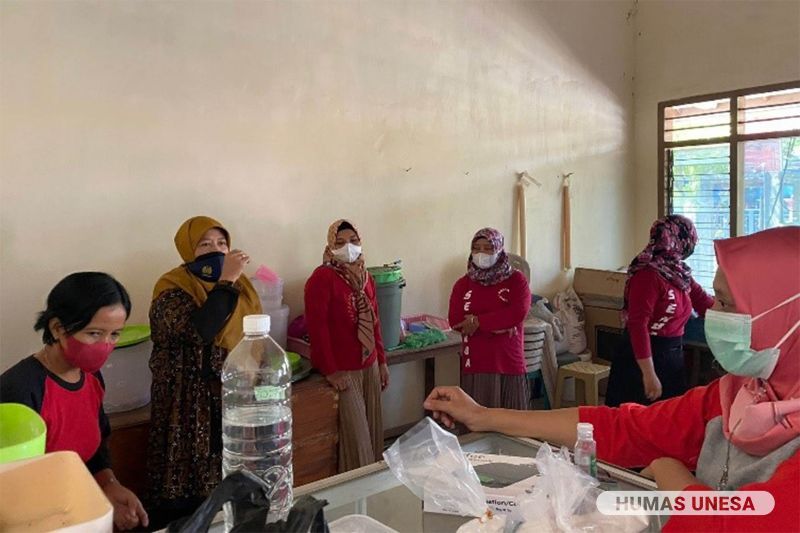
www.unesa.ac.id
Unesa.ac.id, SURABAYA–There are many ways that can be done to mobilize and empower rural women in the regions. One of them can be in the form of training on the establishment of a home-industrial scale business as carried out by the UNESA lecturer team. They started a home soap industry in Sidokare Village, Nganjuk Regency. The home-based business was co-founded and managed by women, most of whom are housewives (IRT) in the village.
Previously, the UNESA Chemistry lecturer team consisting of Prof. Dr. Sari Edi Cahyaningrum, M.Sc., Prof. Dr. Titik Taufikurohmah, Dr.Nurhayati, M.T., and Fitriari Izzatunnisa Muhaimin, B.Sc, M.Sc, provided training. There is training on how to make dish soap and transparent soap as well as marketing management training and online marketing.
Prof. Sari Edi stated that although the training and business are home-scale, they still pay attention to the quality of production, to meet the health aspect and of course to meet the needs of the community. The soap, processed from herbal ingredients that are easily available in the surrounding environment, such as aloevera, betel leaf and papaya.
They produce two types of dish soap, namely Gocling and Sidokare Sembada. In addition, there are also various transparent solid soaps with herbal ingredients. Several other herbal soaps such as honey soap, papaya soap, betel soap, aloevera soap and yam soap. "These products are starting to be tested to be marketed by PKK women in Sidokare Village, so they can increase their income," she explained on Saturday, November 20, 2021.
Through this pioneering business, they intend to empower the women of Sidokare Village. Domestic workers have skills plus businesses that can increase the income of families and local communities. In addition, it is also to present an innovation for dish soap that is healthy and environmentally friendly, because it is made from herbal ingredients. "Home industries that can be used as business startups to support the family economy," he said.
He added that it was time for women in villages and regions to be directly involved in the creative sector. It can be started from simple innovations and from materials that are easily obtained from the surrounding environment.
He gave an example, such as making soap, it doesn't have to be a big company, but women can actually and that's what the team wants to show through the home-based business startup. Then you can also make bags or home decorations from existing materials. "The potential is there, that's what we explore and train, when they already have the competence, they can run into a business and later can have an impact on the family economy," he explained.
The PKM program, which is a home-based business, deliberately targets women, especially housewives, so that they are able to make dish soap and transparent solid soap, understand marketing management, and online marketing techniques.
That is the focus of the PKM team that he chaired. They do not work alone, but also collaborate with the local village and sub-district government. He continued, the cooperation is not only to establish a home-based business, but can also continue to be developed to a larger and more massive level as well as in other fields. "Soap products, if necessary, become part of the identity of local village and urban village products," said Prof. Sari Eddie.
Farida Nurhayati, SPd. As the head of Dharma Wanita, Sidokare Village, he positively welcomed the activities and pioneering home businesses. She supports the program and hopes that the soap product made by Sidokare women will be one of the village's superior products. In fact, he will allocate a budget so that the soap can be part of the Bumdes. [UNESA PR]
Author: PKM Team and Hasna
Editor: @zam*
Share It On:






